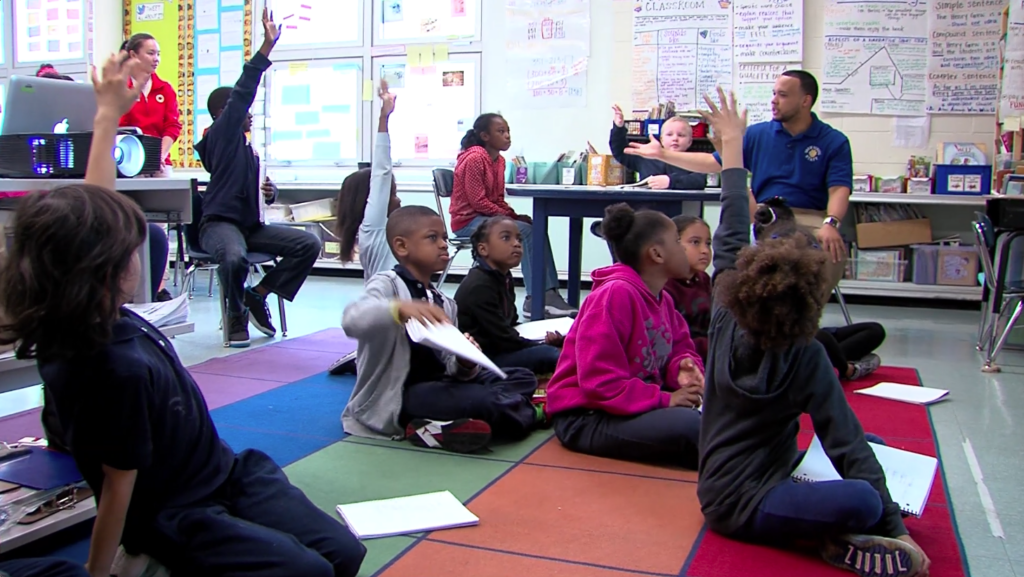Developing an Equitable Math Learning Community from Day 1
by Megan Murray
September 10, 2025

Helping students recognize and develop their mathematical power requires a collaborative and equitable learning environment. Such a community is committed to providing access to rigorous, cognitively demanding mathematics for, and valuing the mathematical ideas of, each and every student, especially those who have been historically marginalized in mathematics classrooms. As A Framework for Reflecting about Equity in the Elementary Mathematics Classroom says:
“In a strong collaborative mathematics community students are encouraged to work together to solve problems, to learn from each other, to take risks, to support and encourage others, and to be supported and encouraged by others in their growth as mathematics learners. In a collaborative learning environment, students play an active role in their learning. Students have opportunities to decide how they are going to solve problems, to select tools and materials, and to choose which activities they work on. They are invited to keep thinking about mathematical ideas that come up in class and to ask their own mathematical questions. … All students are invited to express their ideas, to revise and build on them, to have others respectfully listen to and engage with their ideas, and to be seen as mathematical thinkers who make meaningful contributions to classroom conversations. This is true whether they are working alone, with a partner, in a small group, or as part of a whole class discussion. Having one’s ideas taken up publicly and considered seriously supports students’ developing identities and agency as mathematicians.” (Russell, et. al., 2023, p. 5)
Establishing and maintaining such a learning community requires explicit attention, careful planning, and hard work, from the beginning of the school year. The Forum for Equity in Elementary Mathematics has developed resources to support educators in doing this work.
- Setting Up the Classroom. A Space for All of Us explores how the design of a room can “promote the distribution of math authority, equitable participation, and respect for different learners…[and]… ensure that students see themselves, feel welcome, and understand that this will be a joint undertaking.”
- Co-Creating Classroom Agreements. A New Class, A New Year discusses ways to jointly create, practice, sustain, and embody “clear, actionable classroom agreements that help foster mathematical learning and broad-based participation.”
- Getting to Know Students. “Gathering information about students’ experiences in math is an important part of establishing and maintaining an equitable learning community.” The Forum’s Student Reflection Tool is designed to support teachers in learning about students’ mathematical strengths and dispositions, their mathematical experiences and expectations, and their sense of themselves as learners and as mathematicians, at the beginning of and throughout the year. It offers a bank of questions and sample questionnaires focused on these (and other) topics.
- Classroom Structures that Support Equity. Math classes involve activities and conversations that happen in pairs, small groups, and whole-class. The structures that support such work provide opportunities to support all students in developing a positive identity and sense of agency in the math classroom. Learn more about:
- Reflecting on Participation. Because structures like partner work and whole class discussions are essential in developing students’ mathematical power, it important to learn about and reflect on how students are participating in them. The Forum’s Teacher Reflection Tools are “designed to help teachers keep equitable participation at the forefront as they plan for and facilitate whole group discussions and small group/pair work by engaging them in cycles of evidence-based reflection.”
The resources above are meant to support teachers in establishing and sustaining a community where “all students are assured equitable distribution of resources including time to develop ideas, attention to their mathematical thinking, and an assurance that every student will have multiple opportunities to contribute and participate.” (Godfrey, 2023) As Godfrey says, this work challenges us to regularly ask ourselves:
- Who has access?
- Whose voices are heard and not heard and why?
- Whose questions are explored?
- Where is the authority for determining right and wrong answers located in the classroom?
- How are mistakes normalized and used as resources for learning?
- Who determines what it means to be successful and how is success measured?
Then we must reflect on and respond to what we find out. “This choice to pay attention to and respond to students’ needs and current dispositions is a critical step in developing an equitable learning environment.” (The Math Equity Forum at TERC, 2023.)
References/Resources
Garcia, Marta. (August 29, 2025). A New Class, a New Year: The Role of Classroom Agreements. Math Equity Forum Blog. https://www.terc.edu/mathequityforum/classroom-agreements/
Garcia, Marta. (August 28, 2025). A Space for All of Us: Setting up the Classroom. Math Equity Forum Blog. https://www.terc.edu/mathequityforum/setting-up/
Godfrey, Lynne. (October 2, 2023). Establishing an Equitable Learning Community in the Elementary Mathematics Classroom. Math Equity Forum Blog. https://www.terc.edu/mathequityforum/establishing-an-equitable-learning-community/
The Math Equity Forum at TERC. (2023, October). Student Reflection Tool: Getting to Know Your Students. Forum for Equity in Elementary Mathematics. https://www.terc.edu/mathequityforum/terc_products/getting-to-know-your-students/
The Math Equity Forum at TERC. (2024, April). Teacher Reflection Tool: Equitable Participation in Small Group and Pairs. Forum for Equity in Elementary Mathematics. https://www.terc.edu/mathequityforum/terc_products/equitable-participation/
The Math Equity Forum at TERC. (2023, December). Teacher Reflection Tool: Equitable Participation in Whole Class Math Discussions. Forum for Equity in Elementary Mathematics. https://www.terc.edu/mathequityforum/terc_products/equitable-participation/
Murray, Megan and Economopoulos, Karen. (March 24, 2025). Math Workshop: A Structure that Supports Equity in the Elementary Math Classroom. Math Equity Forum Blog. https://www.terc.edu/mathequityforum/math-workshop/
Murray, Megan and Economopoulos, Karen. (May 22, 2024). Discussions: A Structure that Supports Equity in the Elementary Math Classroom. Math Equity Forum Blog. https://www.terc.edu/mathequityforum/discussions/
Murray, Megan and Economopoulos, Karen. (March 25, 2024). Partner Work: A Structure that Supports Equity in the Elementary Math Classroom. Math Equity Forum Blog. https://www.terc.edu/mathequityforum/partner-work/
Russell, Susan Jo, et al. (2023, September). A Framework for Reflecting about Equity in the Elementary Mathematics Classroom. Forum for Equity in Elementary Mathematics. https://www.terc.edu/mathequityforum/terc_products/framework-reflecting-about-equity/
